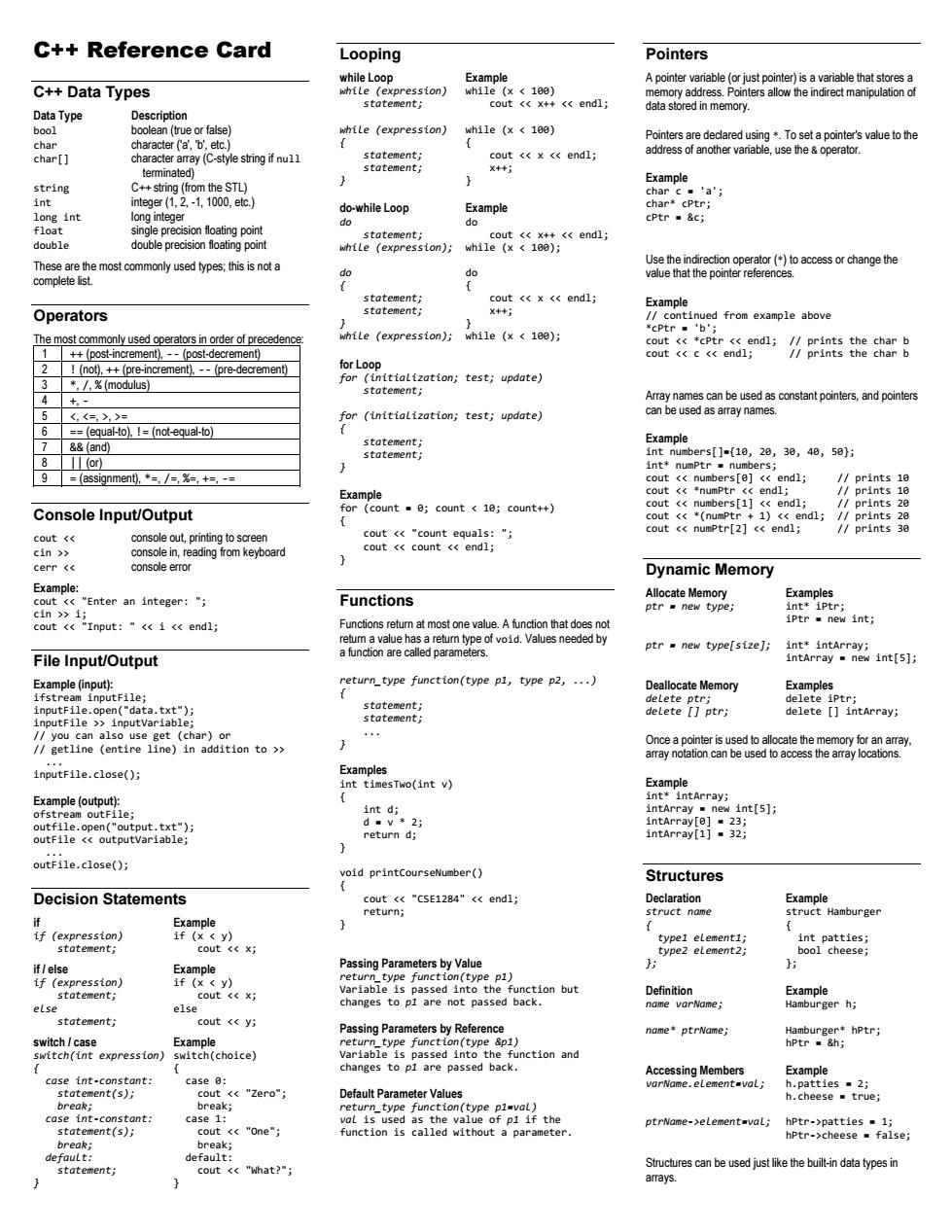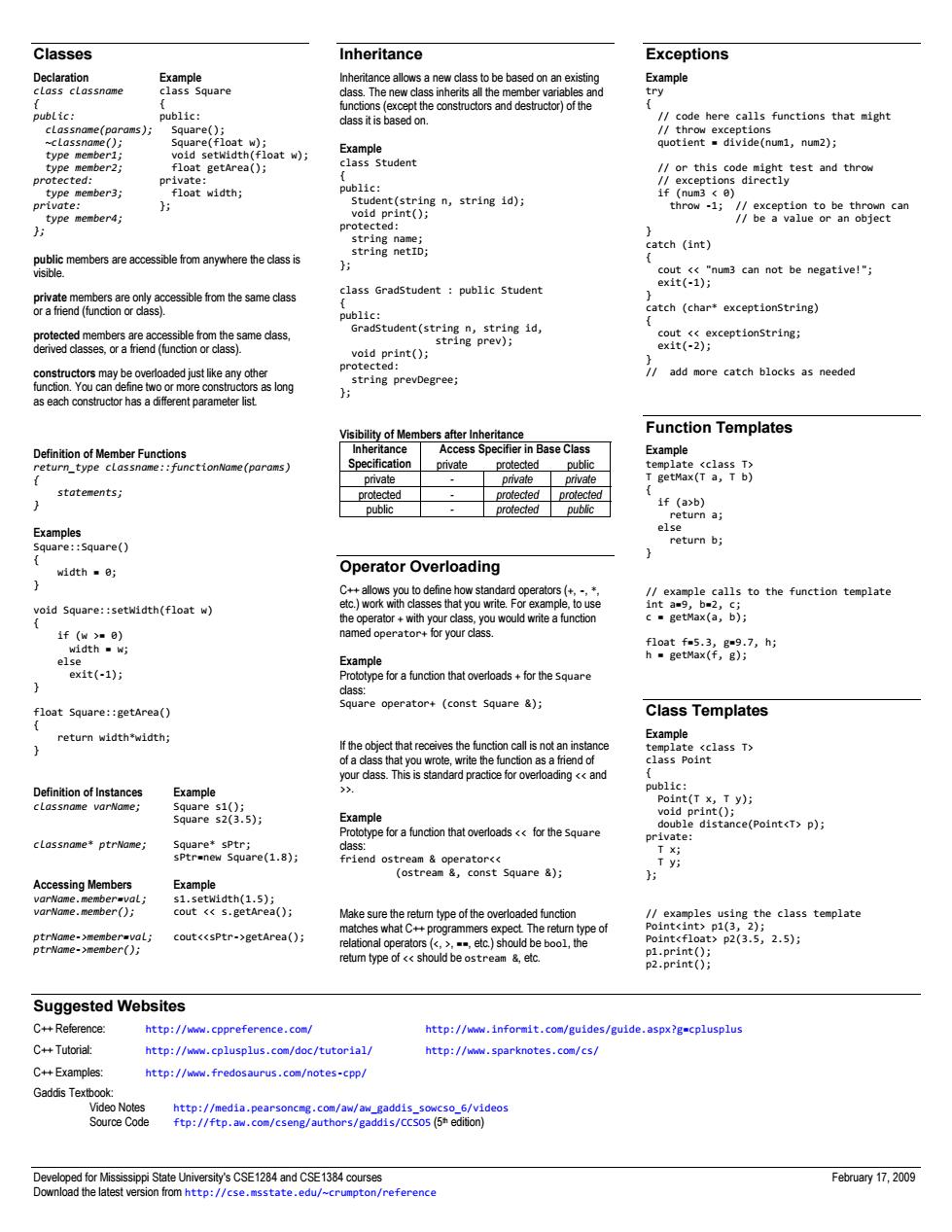
C++Reference Card Looping Pointers C++Data Types Data Type coutnd do-whil Loop Example do orchango th Operators biLe (expresston);hle (x1) oan:升s日 T0gnyeoeapossdpomes oI=(notequal-o】 for (;test;update) nd) statement 》 as5 signment0.*=,/=,=,+=,-= []<endl; Console Input/Output aetoar9a: Dynamic Memory Enter an integer:" Functions ptr new type[sizeli File Input/Output intntt eturntype functton(type pl type p2) Oneanaaboae8ar7ena inputFile.close(): 1 outrile.close() Structures Decision Statements SE2end 0ecatioa Eample ge ype2 eLement2 Passing Paramters by Value unction and a;ptr e2aro uaacome otrName->: ett
C++ Reference Card C++ Data Types Data Type Description bool boolean (true or false) char character ('a', 'b', etc.) char[] character array (C-style string if null terminated) string C++ string (from the STL) int integer (1, 2, -1, 1000, etc.) long int long integer float single precision floating point double double precision floating point These are the most commonly used types; this is not a complete list. Operators The most commonly used operators in order of precedence: 1 ++ (post-increment), -- (post-decrement) 2 ! (not), ++ (pre-increment), -- (pre-decrement) 3 *, /, % (modulus) 4 +, - 5 <, <=, >, >= 6 == (equal-to), != (not-equal-to) 7 && (and) 8 || (or) 9 = (assignment), *=, /=, %=, +=, -= Console Input/Output cout << console out, printing to screen cin >> console in, reading from keyboard cerr << console error Example: cout << "Enter an integer: "; cin >> i; cout << "Input: " << i << endl; File Input/Output Example (input): ifstream inputFile; inputFile.open("data.txt"); inputFile >> inputVariable; // you can also use get (char) or // getline (entire line) in addition to >> ... inputFile.close(); Example (output): ofstream outFile; outfile.open("output.txt"); outFile << outputVariable; ... outFile.close(); Decision Statements if Example if (expression) if (x < y) statement; cout << x; if / else Example if (expression) if (x < y) statement; cout << x; else else statement; cout << y; switch / case Example switch(int expression) switch(choice) { { case int-constant: case 0: statement(s); cout << "Zero"; break; break; case int-constant: case 1: statement(s); cout << "One"; break; break; default: default: statement; cout << "What?"; } } Looping while Loop Example while (expression) while (x < 100) statement; cout << x++ << endl; while (expression) while (x < 100) { { statement; cout << x << endl; statement; x++; } } do-while Loop Example do do statement; cout << x++ << endl; while (expression); while (x < 100); do do { { statement; cout << x << endl; statement; x++; } } while (expression); while (x < 100); for Loop for (initialization; test; update) statement; for (initialization; test; update) { statement; statement; } Example for (count = 0; count < 10; count++) { cout << "count equals: "; cout << count << endl; } Functions Functions return at most one value. A function that does not return a value has a return type of void. Values needed by a function are called parameters. return_type function(type p1, type p2, ...) { statement; statement; ... } Examples int timesTwo(int v) { int d; d = v * 2; return d; } void printCourseNumber() { cout << "CSE1284" << endl; return; } Passing Parameters by Value return_type function(type p1) Variable is passed into the function but changes to p1 are not passed back. Passing Parameters by Reference return_type function(type &p1) Variable is passed into the function and changes to p1 are passed back. Default Parameter Values return_type function(type p1=val) val is used as the value of p1 if the function is called without a parameter. Pointers A pointer variable (or just pointer) is a variable that stores a memory address. Pointers allow the indirect manipulation of data stored in memory. Pointers are declared using *. To set a pointer's value to the address of another variable, use the & operator. Example char c = 'a'; char* cPtr; cPtr = &c; Use the indirection operator (*) to access or change the value that the pointer references. Example // continued from example above *cPtr = 'b'; cout << *cPtr << endl; // prints the char b cout << c << endl; // prints the char b Array names can be used as constant pointers, and pointers can be used as array names. Example int numbers[]={10, 20, 30, 40, 50}; int* numPtr = numbers; cout << numbers[0] << endl; // prints 10 cout << *numPtr << endl; // prints 10 cout << numbers[1] << endl; // prints 20 cout << *(numPtr + 1) << endl; // prints 20 cout << numPtr[2] << endl; // prints 30 Dynamic Memory Allocate Memory Examples ptr = new type; int* iPtr; iPtr = new int; ptr = new type[size]; int* intArray; intArray = new int[5]; Deallocate Memory Examples delete ptr; delete iPtr; delete [] ptr; delete [] intArray; Once a pointer is used to allocate the memory for an array, array notation can be used to access the array locations. Example int* intArray; intArray = new int[5]; intArray[0] = 23; intArray[1] = 32; Structures Declaration Example struct name struct Hamburger { { type1 element1; int patties; type2 element2; bool cheese; }; }; Definition Example name varName; Hamburger h; name* ptrName; Hamburger* hPtr; hPtr = &h; Accessing Members Example varName.element=val; h.patties = 2; h.cheese = true; ptrName->element=val; hPtr->patties = 1; hPtr->cheese = false; Structures can be used just like the built-in data types in arrays

Classes Inheritance Exceptions nce allows dass it is bas getArea() public: type otdtgen,strineidn: Pbtmembesaieacst Eatch (int) rom anywhere the class is 1。 um can not be negative! essible fom the same clas class Gradstudent:public Student atch(cha exceptionstring) r(): string prevDegree add more catch blocks as needed Function Templates Base stotements; if (ab)a idtha Operator Overloading oid square:(o) t elseit(-1) ag65.e37,时 floatSquare::getArea() (const Square Class Templates fheotiecthatreei es the function call is not an ins 2oeamcaa 8 ce(PointT>p)i r(): priva Example d function Pi( he class template cout<<sptr->getArea() 2.50 Suggested Websites C+Reference: http:// http://www.informit.com/guides/guide.aspx?gecplusplus C++Tutorialt: http://.cplusplus.com/doc/tutorial ttp://.sparknotes.com/cs/ C++Exan ple nttp://ww.fredosaurus.com/notes-cpp/
Developed for Mississippi State University's CSE1284 and CSE1384 courses February 17, 2009 Download the latest version from http://cse.msstate.edu/~crumpton/reference Classes Declaration Example class classname class Square { { public: public: classname(params); Square(); ~classname(); Square(float w); type member1; void setWidth(float w); type member2; float getArea(); protected: private: type member3; float width; private: }; type member4; }; public members are accessible from anywhere the class is visible. private members are only accessible from the same class or a friend (function or class). protected members are accessible from the same class, derived classes, or a friend (function or class). constructors may be overloaded just like any other function. You can define two or more constructors as long as each constructor has a different parameter list. Definition of Member Functions return_type classname::functionName(params) { statements; } Examples Square::Square() { width = 0; } void Square::setWidth(float w) { if (w >= 0) width = w; else exit(-1); } float Square::getArea() { return width*width; } Definition of Instances Example classname varName; Square s1(); Square s2(3.5); classname* ptrName; Square* sPtr; sPtr=new Square(1.8); Accessing Members Example varName.member=val; s1.setWidth(1.5); varName.member(); cout << s.getArea(); ptrName->member=val; cout<<sPtr->getArea(); ptrName->member(); Inheritance Inheritance allows a new class to be based on an existing class. The new class inherits all the member variables and functions (except the constructors and destructor) of the class it is based on. Example class Student { public: Student(string n, string id); void print(); protected: string name; string netID; }; class GradStudent : public Student { public: GradStudent(string n, string id, string prev); void print(); protected: string prevDegree; }; Visibility of Members after Inheritance Inheritance Access Specifier in Base Class Specification private protected public private - private private protected - protected protected public - protected public Operator Overloading C++ allows you to define how standard operators (+, -, *, etc.) work with classes that you write. For example, to use the operator + with your class, you would write a function named operator+ for your class. Example Prototype for a function that overloads + for the Square class: Square operator+ (const Square &); If the object that receives the function call is not an instance of a class that you wrote, write the function as a friend of your class. This is standard practice for overloading << and >>. Example Prototype for a function that overloads << for the Square class: friend ostream & operator<< (ostream &, const Square &); Make sure the return type of the overloaded function matches what C++ programmers expect. The return type of relational operators (<, >, ==, etc.) should be bool, the return type of << should be ostream &, etc. Exceptions Example try { // code here calls functions that might // throw exceptions quotient = divide(num1, num2); // or this code might test and throw // exceptions directly if (num3 < 0) throw -1; // exception to be thrown can // be a value or an object } catch (int) { cout << "num3 can not be negative!"; exit(-1); } catch (char* exceptionString) { cout << exceptionString; exit(-2); } // add more catch blocks as needed Function Templates Example template <class T> T getMax(T a, T b) { if (a>b) return a; else return b; } // example calls to the function template int a=9, b=2, c; c = getMax(a, b); float f=5.3, g=9.7, h; h = getMax(f, g); Class Templates Example template <class T> class Point { public: Point(T x, T y); void print(); double distance(Point<T> p); private: T x; T y; }; // examples using the class template Point<int> p1(3, 2); Point<float> p2(3.5, 2.5); p1.print(); p2.print(); Suggested Websites C++ Reference: http://www.cppreference.com/ http://www.informit.com/guides/guide.aspx?g=cplusplus C++ Tutorial: http://www.cplusplus.com/doc/tutorial/ http://www.sparknotes.com/cs/ C++ Examples: http://www.fredosaurus.com/notes-cpp/ Gaddis Textbook: Video Notes http://media.pearsoncmg.com/aw/aw_gaddis_sowcso_6/videos Source Code ftp://ftp.aw.com/cseng/authors/gaddis/CCSO5 (5th edition)